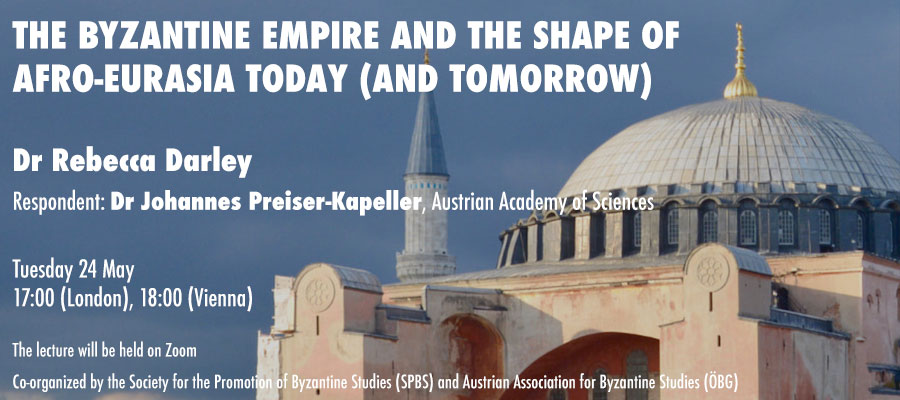The Byzantine Empire and the Shape of Afro-Eurasia Today (and Tomorrow), lecture by Rebecca Darley (University of Leeds), Society for the Promotion of Byzantine Studies (SPBS) and Austrian Association for Byzantine Studies (ÖBG) Joint Lecture, Zoom, May 24, 2022, 5:00 pm (London)/6:00 pm (Vienna)
Between the fourth century and the eleventh, the Byzantine Empire was the hinge point in a power shift that continues to shape global geopolitics today. In the fourth century the Mediterranean was a Roman sea. Italy was closer culturally and politically to North Africa than to France or Germany, the Mediterranean coast of West Asia to Greece and even the Iberian peninsula than to southern Arabia. By the eleventh century the Mediterranean was divided more-or-less on a Northwest to Southeast axis between increasingly mutually self-defining Islamicate and Christian spheres. It was becoming increasingly normal for political leaders and social commentators to think of social solidarity being defined by this line and military mobilisation crossing it. This much has not gone unnoticed in world history, though it can too easily be re-imagined by politicians as an eternal state of affairs. The critical role that Byzantium played in this transformation, however, and the role that Byzantine studies has to play in understanding it has, however, been less well-explored. This lecture will examine Byzantium as a consistent challenge to efforts to define Europe, the world and the Mediterranean as a battleground between East and West, Muslim and Christian, ‘us’ and ‘other’.
Rebecca Darley is Lecturer in Global History (500–1500) at University of Leeds.
Respondent: Dr Johannes Preiser-Kapeller (Austrian Academy of Sciences)
Advance registration required.
